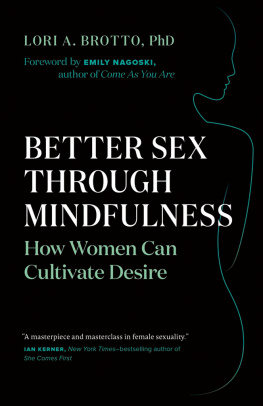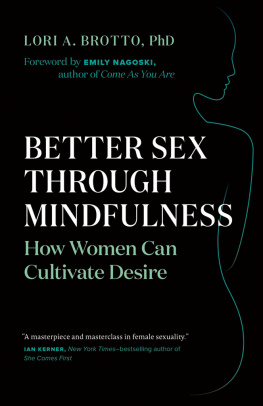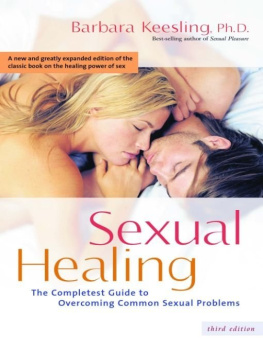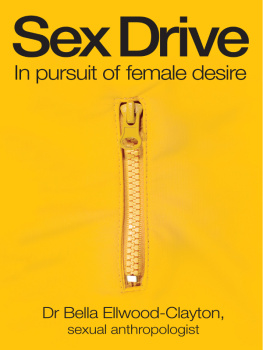Dr Rosie King is Australias best-known sex therapist. Her previous groundbreaking book, Good Loving, Great Sex, was a bestseller in Australia. She has over 30 years of clinical experience and has been well known for her weekly advice column in Womans Day magazine since 1993. For more information, go to her website at www.drrosieking.com.au.
Introduction
Do you have fond memories of the passionate sexual encounters you enjoyed when you first got together with your partner? Remember how you couldnt wait to be together? How you couldnt keep your hands off each other? You would have hot sex whenever the opportunity arose, and both of you were equally keen to get it on. What happened to those ardent feelings of sexual desire, those feelings of mutual lust? He stills wants sex, but where did your libido go?
For many women in long-term relationships, feeling horny is little more than a distant memory. Sex has become just another chore to be attended to in daily life and in terms of priority its way down the list. When sex does happen, its often grudgingly agreed to out of guilt and obligation instead of desire. Many women say they wouldnt care if they never had sex again.
Despite their lack of desire (sexual desire here is synonymous with libido), for some women sexual activity is surprisingly enjoyable; others find sex tedious and unrewarding. What these women with low libido have in common is the unhappiness and frustration of their more sexually interested partners. Some men suffer in silence, but there are plenty who complain very loudly about their unmet sexual needs. The end result is relationships full of tension and resentment, where both partners are miserable.
Low libido is common. In fact, it is the most common sexual problem I encounter in my clinical practice as a sex therapist. Almost every day, I am consulted by women (and often their partners) who are struggling to understand their situation and are desperately looking for solutions to their desire problems. These women feel bewildered by their lack of interest in sex often, they have had robust libidos in the past and cant figure out what happened, why it all changed. Typically, they have no idea which way to turn or what to do next.
I have written this book as a practical guide for the many women who feel little or no desire for sex. It contains helpful advice for any woman who has less interest in sex than her partner. While, for purposes of simplicity, it is principally aimed at heterosexual women, the suggestions herein can equally apply to bisexual and lesbian women. This book aims to help you (and your partner) to understand:
how your sexual desire works
how to maximise your libido
how to increase your sexual enjoyment, and
how to create a regular, satisfying sex life even if you have low desire.
The first chapters will help you to understand your sexual desire. They describe how desire fluctuates and explore the reasons why libido rises and falls throughout life. They look at the wide range of normal desire from low to high and explain why so many women feel disappointed with their libidos.
The following chapters look at the impact of differing levels of desire on your relationship and describe the unhappiness many couples feel when there is a mismatch in sexual drives.
In subsequent chapters, you will learn how to maximise your libido, improve your relationship and have better, more satisfying sex.
In the final chapters are strategies to help you achieve regular, enjoyable sexual activity that suits both you and your partner, irrespective of your individual levels of desire.
The book contains some sections written specifically for the man in your life, called For Your Partner. Chapters 10, 11, 13 and 14 have been written for both of you to read, and there are many other passages that your partner might also find helpful. For your and your partners convenience, the key points have been summarised at the end of each chapter to provide a quick overview of what has been discussed.
The book also contains numerous examples from men and women who are experiencing the particular issues under discussion. These are fictitious in the sense that they are not direct quotations and the stated names and ages are not actual, but real in being typical of what people in these situations say to me in my clinical practice. I have respected their privacy by using pseudonyms and amalgamating their experiences.
Finally, a brief but important word about safe sex: dont take risks with your health. Before you engage in any sexual activity, ensure that you and your partner are fully protected from sexually transmitted infections. When the mood strikes, often the last thing on your mind is the need for safer sex. Yet it is important to protect both yourself and your partner. Take responsibility for your own safety during sex and talk to your partner about it beforehand. If youve done this before things get hot and heavy, then you dont have to interrupt intimate moments to have clinical conversations. Many people think that safer sex cant be spontaneous, exciting or feel good. Nothing could be further from the truth. Sex will be more enjoyable when you are not worrying about catching an infection. Safer sex is the key to staying healthy and enjoying peace of mind.









